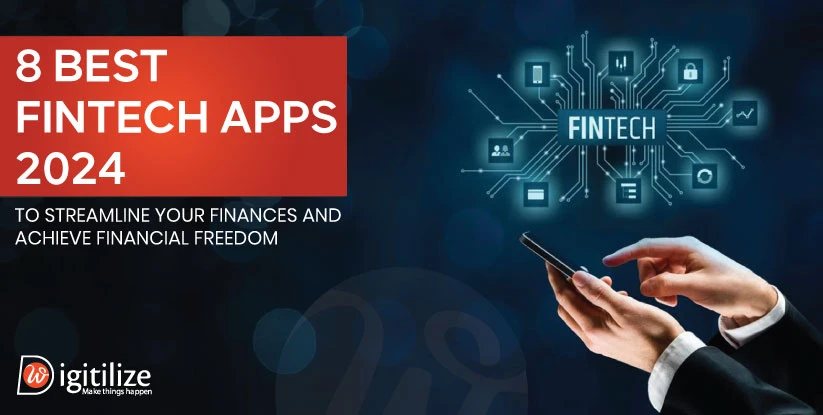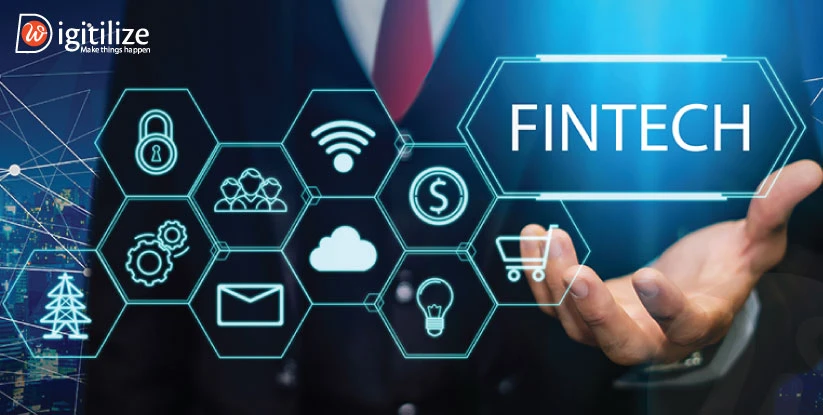8 Best Fintech Apps 2024 to Streamline Your Finances and Achieve Financial Freedom?

Fintech, short for financial technology, is revolutionizing how we manage money and interact with financial services. With the rise of digital platforms,
mobile apps, and innovative tools, fintech is transforming everything from payments and lending to investments and insurance.
With Fintech applications, smartphone users may monitor the stock market, pay bills, transact in numerous currencies, and conduct financial activities. An online banking app is another name for it. It makes handling digital payments more manageable for people, businesses, and organizations. Best
Fintech Apps is not new; it first appeared in the early twenty-first century.
Several companies have released Fintech mobile applications. You will want assistance from a reputable app development firm if you also intend to have a fintech app for your organization. This is because experts know the specialized technology utilized for online banking systems. The most popular and cutting-edge 8
best fintech apps available in 2024 that have transformed the financial sector will be looked at in this article.
8 Best Fintech Apps

Nubank stands out as one of the top fintech apps for tracking payments and invoicing. The team behind it values the database for its speed, scale, and stability. They don’t need to stress over system performance. Instead, they can focus on building features and improving the user experience. Nubank gives real-time updates on credit card balances, savings accounts, and reward points. Everything is easy to access and quick to load.
Mint is a thorough
best financial management apps UK that aids users in
UK budgeting and savings apps. It synchronizes with their bank accounts, credit cards, and invoices for a complete picture of the users’ financial condition. Mint helps UK users make smart money decisions. It sorts transactions into categories and builds custom budgets. The app also gives personal insights based on spending habits.
Its user-friendly design and clear visuals make it easy to spot trends and find ways to save. Mint also sends bill reminders and alerts to keep users on track. It’s one of the best personal finance apps for UK users who want full control over their money.
Users may send money quickly and securely with the well-known
peer-to-peer (P2P) lending payment platform Zelle. Zelle lets users send money straight from their bank accounts. No extra sign-ups or transfers needed. It works directly with many participating banks.
The biggest advantage? Zelle’s huge partner network. You can send money easily to friends or family, even if they use a different bank. Transfers happen almost instantly. Recipients get their money within minutes. It’s fast, simple, and reliable.
Prepare to bid a fond farewell to unforeseen bank fees for receiving and sending money. It is the first entirely mobile bank in Europe. More than 750 million people utilize N26 throughout 24 nations. This one is one of the quickest and most adaptable tools for money
investment management. Furthermore, the country where you reside permits two free ATM withdrawals monthly. The leading fintech app, N26, gives you complete control over your money. App users may benefit from quick, precise, and flexible money management solutions. The app’s intuitive design and straightforward pricing make it an appealing choice for individuals seeking a cutting-edge and practical banking experience.
Coinbase offers a wide variety of decentralized innovations. Rare digital artwork and other digital valuables are collected by it. Additionally, it accepts cryptocurrency. The Coinbase app uses blockchain and cryptocurrency technology. One of the most popular mobile applications is this one. You can monitor Bitcoin trades with this top fintech software.
Chime is a personal finance platform that provides an alternative to conventional banks. As part of the fundamental package, Chime offers one bank account, a protected credit card, and a savings account. Because it offers a variety of automated saving choices, it is a well-known
money management apps UK 2024. A feature of the app is its extensive and accessible ATM networking. Chime doesn’t charge extra fees to manage consumers’ spending and savings accounts.
The mobile banking app SoFi is for social finance. You may apply for student loans using this online portal. In addition, it offers career guidance in its advertising for young people. One of the most popular fintech applications, SoFi, may assist users in making wise financial decisions. SoFi’s cutting-edge
financial tracking and
best fintech tools for savings UK , spending, investing, and borrowing. The finest fintech may be used to finance a home purchase, pay for college, pay off debt, and save for retirement, among other things.
One of the fintech applications for beginners that allows micro-investing is Acorns. Using this software will make
investing apps for UK beginners less intimidating. Simple interfaces and helpful guides make it easier for new investors to get started. Acorns is a great option for beginners. Its mobile app is easy to use and designed to simplify money management. Users can access a built-in bank account, tax-advantaged IRA options, and a robo-advisor that manages investments automatically. Everything is in one place, making it ideal for people new to investing.
Different types of Fintech app

Fintech apps have helped many businesses and users improve their financial experience. These apps make services faster, easier, and more secure. Companies and individuals use different types of apps based on their goals. Some focus on payments, others on budgeting, investing, or lending. If you’re starting a fintech startup, pick the right app category based on your target users. The right choice can boost growth and customer trust.
Customers may receive financial services and manage their accounts using
digital banking applications without physically visiting a branch. It includes mobile and internet banking to offer financial services wherever and whenever needed. To pay your expenses, for instance, app alerts might alert you when your salary comes in. Most banking programs allow you to set up automated payments, so you don’t need to do this manually.
Insurance technology applications significantly enhance the insurance industry by providing more accurate risk assessment. Furthermore, they offer policyholders the convenience of swiftly applying for coverage or managing claims. These applications cover various insurance types, including property and auto insurance. While some apps assist insurance agents in conducting on-site risk evaluations and closing deals, most are designed for customers who wish to efficiently
top UK apps for managing finances, their policies and initiate claims.
Loan apps streamline financing by putting the lender and borrower in close contact. The platforms control everything, including loan payments and the application process. The fact that loan applications are available at institutions other than banks and credit unions is novel. Another feature that certain applications offer is peer-to-peer (P2P) lending, which allows users to lend money and get interest.
One of the biggest strengths of fintech is smarter money management. Personal finance apps are a perfect example. Think of them as digital financial advisors. To get started, just set a financial goal and connect your bank accounts. The app pulls all your financial data into one place. This simple step makes a big difference. You can track spending, spot patterns, and stay on budget more easily. It’s a smart move for anyone looking to take control of their money in 2025.
Payment processing applications manage a company’s payment transactions, acting as intermediaries between the cardholder’s data and the credit card issuers. The following informative diagram illustrates how payment processing fits into a
typical eCommerce environment. In this scenario, they enable small businesses to accept credit card and online payments, making it easy for anyone to receive payments, including individual users.
Benefits of the Fintech app

FinTech applications expand financial inclusion by enabling consumers to access previously inaccessible financial services and items. This positively impacts financial inclusion and empowerment, especially in disadvantaged communities.
Digital banking systems help businesses automate key financial tasks. They make bookkeeping easier and faster. With real-time tracking, you can monitor every transaction as it happens. You also get instant updates. This means payments are made and received quickly, helping you manage cash flow better and avoid delays.
For organizations and developers, cost savings are one of the significant advantages of developing fintech apps. Moreover, since the code for the
top UK fintech apps 2024 can be reused for other applications, developers can concentrate on other crucial areas of application development, all while saving both time and money.
Fintech solutions can make the investment process faster and more efficient. When businesses use fintech tools, they save time, reduce errors, and grow faster. Fintech also helps individuals manage money better. With the right tools, people can track spending, avoid debt, and build financial stability. In 2025, smart use of fintech means better control, smarter investments, and stronger growth for both companies and users.
Most FinTech apps in 2025 use advanced security tools to protect user data and transactions. They also offer custom features, letting users get quick and efficient services. Startups benefit the most. These apps help them simplify complex business tasks, access funds easily, and explore flexible funding options—all in one place.
-
Enhance users’ experience
Fintech tools can boost your organisation’s efficiency. They simplify the investment process and save time. This lets teams focus on smarter decisions—not manual tasks. Fintech also improves the customer experience. You can offer faster services, better support, and easier access to financial tools. Even better, these solutions are often cost-effective. You get more value without raising your budget. That’s why fintech is a smart choice for growth in 2025.
Those who utilise financial technology use mobile communication, which enhances the system’s agility, simplifies transaction tracking, facilitates communication among users, and resolves issues. However, this primarily broadens the pool of people who can use it.
So, if you have thought of having any new financial app for your business, you must
hire dedicated developers from
DigitilizeWeb to have your desired
app development.
Top features you must include in your next app

Fintech apps are built to match user needs and market trends. Most payment apps share basic features like transfers and balance checks. But many also offer unique tools that stand out.
Good UI/UX design makes these apps easy to use. Clear menus, simple layouts, and fast loading improve the user experience. UI focuses on how the app looks. UX focuses on how it works. Together, they create a smooth and reliable experience for users. For fintech apps, both design and function matter.
-
Monitoring and Live Spending
One of the most useful features in a fintech app is live tracking. It helps users review reports, monitor spending, and stay in control of their finances. Real-time stats make everything faster and easier. Users don’t need to guess where their money goes, they see it instantly. Top financial apps already offer this. If you’re building your first fintech application, include live tracking from the start. It adds real value and builds trust.
-
Notification in Real Time
Users can receive
real-time notifications to learn about financial news, changes, and money transfers. They receive notifications for investments, immediate money transfers, bill payments, etc. A financial app becomes user-friendly thanks to this functionality.
Fintech apps today do more than just banking or crypto trading. Many also give you access to free financial advice. You can get help from professionals or use built-in robo-advisors to guide your investments. These tools help you make smarter choices and avoid losses. Top fintech apps now offer a mix of human and automated advice. Depending on your investment plan, you may get updates weekly, monthly, or even quarterly.
Conclusion
The blog on the 8
best fintech apps available in 2024 comes to an end here. You may also create a competitive
fintech app; information on the types and examples of fintech applications can help you become more knowledgeable. It will improve the quality of your
app development process and assist you in selecting the top team for your business app.
Follow more on
LinkedIn.
Frequently Asked Questions
Fintech apps typically offer more flexibility, convenience, and accessibility compared to traditional banking services. They often have lower fees, provide real-time updates, offer innovative features, and may not require users to visit physical branches.
Yes, fintech apps often have lower fees compared to traditional banks, and some even offer fee-free services for basic transactions. Additionally, they provide insights into spending patterns, helping users identify areas where they can cut costs and save money over time.
Yes, fintech apps cater to users across different age groups, from young adults just starting their financial journey to retirees managing their savings and investments. These apps offer customizable features and user-friendly interfaces, making them accessible and beneficial to a wide range of users.
Fintech apps often target underserved populations by providing alternative financial services such as digital banking, remittances, microloans, and peer-to-peer lending. By leveraging technology and innovative business models, these apps increase financial inclusion, offering accessible and affordable financial solutions to individuals who may not have access to traditional banking services.
Yes, many fintech apps now offer features for buying, selling, and managing investments in cryptocurrencies like Bitcoin, Ethereum, and others. These apps provide real-time market data, portfolio tracking, price alerts, and educational resources to help users navigate the cryptocurrency market and make informed investment decisions.
Reputable fintech apps prioritize data privacy and adhere to strict security standards to protect users' personal and financial information. They typically provide transparent privacy policies, obtain user consent for data collection and sharing, and offer options for controlling data sharing preferences to ensure users' privacy rights are respected.
 Fintech, short for financial technology, is revolutionizing how we manage money and interact with financial services. With the rise of digital platforms, mobile apps, and innovative tools, fintech is transforming everything from payments and lending to investments and insurance.
With Fintech applications, smartphone users may monitor the stock market, pay bills, transact in numerous currencies, and conduct financial activities. An online banking app is another name for it. It makes handling digital payments more manageable for people, businesses, and organizations. Best Fintech Apps is not new; it first appeared in the early twenty-first century.
Several companies have released Fintech mobile applications. You will want assistance from a reputable app development firm if you also intend to have a fintech app for your organization. This is because experts know the specialized technology utilized for online banking systems. The most popular and cutting-edge 8 best fintech apps available in 2024 that have transformed the financial sector will be looked at in this article.
Fintech, short for financial technology, is revolutionizing how we manage money and interact with financial services. With the rise of digital platforms, mobile apps, and innovative tools, fintech is transforming everything from payments and lending to investments and insurance.
With Fintech applications, smartphone users may monitor the stock market, pay bills, transact in numerous currencies, and conduct financial activities. An online banking app is another name for it. It makes handling digital payments more manageable for people, businesses, and organizations. Best Fintech Apps is not new; it first appeared in the early twenty-first century.
Several companies have released Fintech mobile applications. You will want assistance from a reputable app development firm if you also intend to have a fintech app for your organization. This is because experts know the specialized technology utilized for online banking systems. The most popular and cutting-edge 8 best fintech apps available in 2024 that have transformed the financial sector will be looked at in this article.





